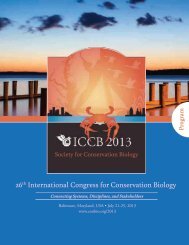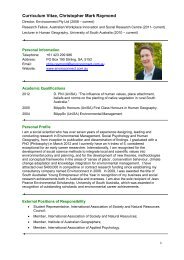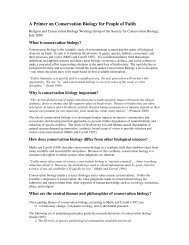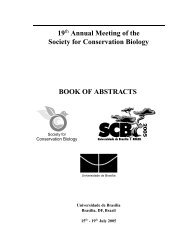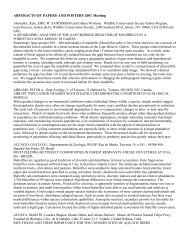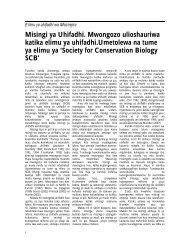Abstracts available here - Society for Conservation Biology
Abstracts available here - Society for Conservation Biology
Abstracts available here - Society for Conservation Biology
Create successful ePaper yourself
Turn your PDF publications into a flip-book with our unique Google optimized e-Paper software.
25th International Congress <strong>for</strong> <strong>Conservation</strong> <strong>Biology</strong> • Auckland, New Zealand • 5-9 December 2011<br />
The constitutional dictate to protect biodiversity in Papua New Guinea<br />
is implemented through legislative and project initiatives that most<br />
commentators believe are inadequate. A new impetus <strong>for</strong> conservation has<br />
emerged through funding <strong>for</strong> climate change adaptation and mitigation.<br />
We reviewed 20 years of conservation projects in PNG and suggest<br />
ways to improve on them. In the past t<strong>here</strong> have been differing world<br />
views and motivations <strong>for</strong> conservation between project proponents and<br />
locals, and a profound lack of insight into the local cultural context. The<br />
development aspirations of locals have not been met by projects that could<br />
not compete with extractive industries. And when they tried, economic<br />
motivations took attention away from conservation and this disappeared<br />
completely when goods and services were not delivered. Projects alienated<br />
local people by not sharing knowledge and in<strong>for</strong>mation with them during<br />
design and implementation. Project proponents need to work with locals in<br />
defining conservation in the local context and understanding its practical<br />
implications <strong>for</strong> things like food security, cultural survival and adaptation<br />
to climate change. Projects must operate at appropriate social scales<br />
and support not supplant local knowledge and social systems. Strategic<br />
partnerships are required to avoid conservationists filling the role of other<br />
groups. Careful attention to past mistakes and ways of avoiding them<br />
should result in more conservation successes in PNG.<br />
Supporting on-ground education & outreach ef<strong>for</strong>ts, e.g. Baviaanskloof<br />
Nature Awareness Group - a grassroots initiative driven by local youth as<br />
a result of their combined ef<strong>for</strong>ts to reconnect themselves, school children<br />
and broader community with nature. This poster will present research and<br />
education outputs from each of the above areas.<br />
2011-12-07 18:00 Meaningful nature experiences: reconnecting<br />
society with a conservation ethic<br />
ZYLSTRA, MJ*, Dept. <strong>Conservation</strong> Ecology & Entomology,<br />
Stellenbosch University; Knight, AT, Dept. <strong>Conservation</strong> Ecology &<br />
Entomology,Stellenbosch University; Esler, KJ, Dept. <strong>Conservation</strong><br />
Ecology & Entomology,Stellenbosch University; Le Grange, L, Faculty<br />
of Education (Curriculum Studies), Stellenbosch University;<br />
Eco-literacy decline, technology immersion, in<strong>for</strong>mation saturation and the<br />
‘extinction of experience’ are all recognised as contributors to the disconnect<br />
separating an increasingly urbanized society and the rest of nature. Bridging<br />
this divide is a transdisciplinary and cross-sectoral endeavour which must<br />
simultaneously focus on policy change and personal change. <strong>Conservation</strong><br />
science’s ef<strong>for</strong>ts have largely focused on policy change with rational<br />
in<strong>for</strong>mation-rich ‘need to act’ messages. Such messages are often ineffective<br />
in engaging the public at the personal level. Environmental psychology<br />
perspectives reveal that we must rather emotionally inspire the individual<br />
with ‘love to act’ messages. Meaningful nature experiences (MNEs)<br />
provide an avenue <strong>for</strong> realising multiple aspirations linked to societal<br />
engagement and the fostering of a sustainability ethic. Mixed methods<br />
research involving persons who have had profound encounters with wildlife<br />
provides new evidence <strong>for</strong> being more connected to nature and impassioned<br />
<strong>for</strong> conservation. Results suggest that MNEs influence an individual’s<br />
behaviour toward the environment (the outer) and also support human<br />
development (the inner). Education influences how MNEs are perceived,<br />
particularly with reference to the impact of invasive alien species. This all<br />
carries implications when designing educational and/or social marketing<br />
interventions. We conclude that MNEs should become more central to the<br />
conservation-society dialogue.<br />
2011-12-08 18:30 The science, action and art of reconnecting with<br />
nature through meaningful experience<br />
ZYLSTRA, MJ*, Dept. <strong>Conservation</strong> Ecology & Entomology,<br />
Stellenbosch University;<br />
eyes4earth.org is an action research initiative encouraging shared learning<br />
about the benefits of reconnecting with nature through meaningful<br />
experience. eyes4earth.org is a transdisciplinary endeavour exploring: 1.<br />
If/how meaningful experiences and profound encounters with wildlife<br />
reconnect humans with nature; 2. How ecological change (focusing on<br />
impacts from alien invasive species) affects the intensity and frequency of<br />
meaningful nature experiences; and 3. How insights from such experiences<br />
may practically in<strong>for</strong>m action-oriented education <strong>for</strong> sustainability (in<br />
building social-ecological resilience). eyes4earth.org aims to stimulate<br />
public awareness and reflection on the profound ways we benefit,<br />
interact and participate with nature. It is doing this through: 1. Science:<br />
Strengthening capacity to further research on the links between meaningful<br />
experience and connectedness to nature to better in<strong>for</strong>m education <strong>for</strong><br />
sustainability; 2. Art: Utilising a range of social media tools to engage and<br />
interact with the public. Sharing personal stories collated on meaningful<br />
nature experiences through creative audio and visual material; 3. Action:<br />
185



